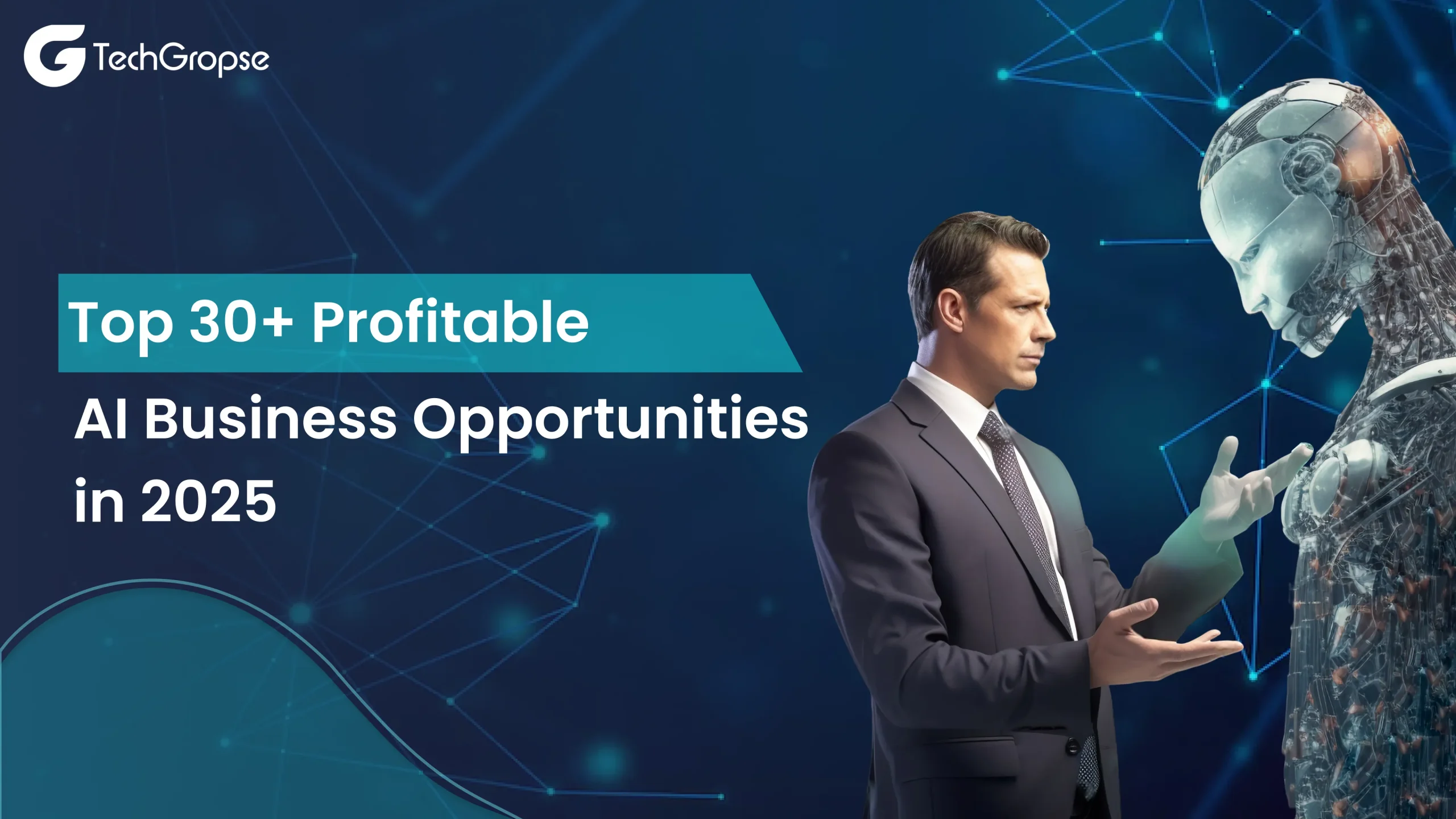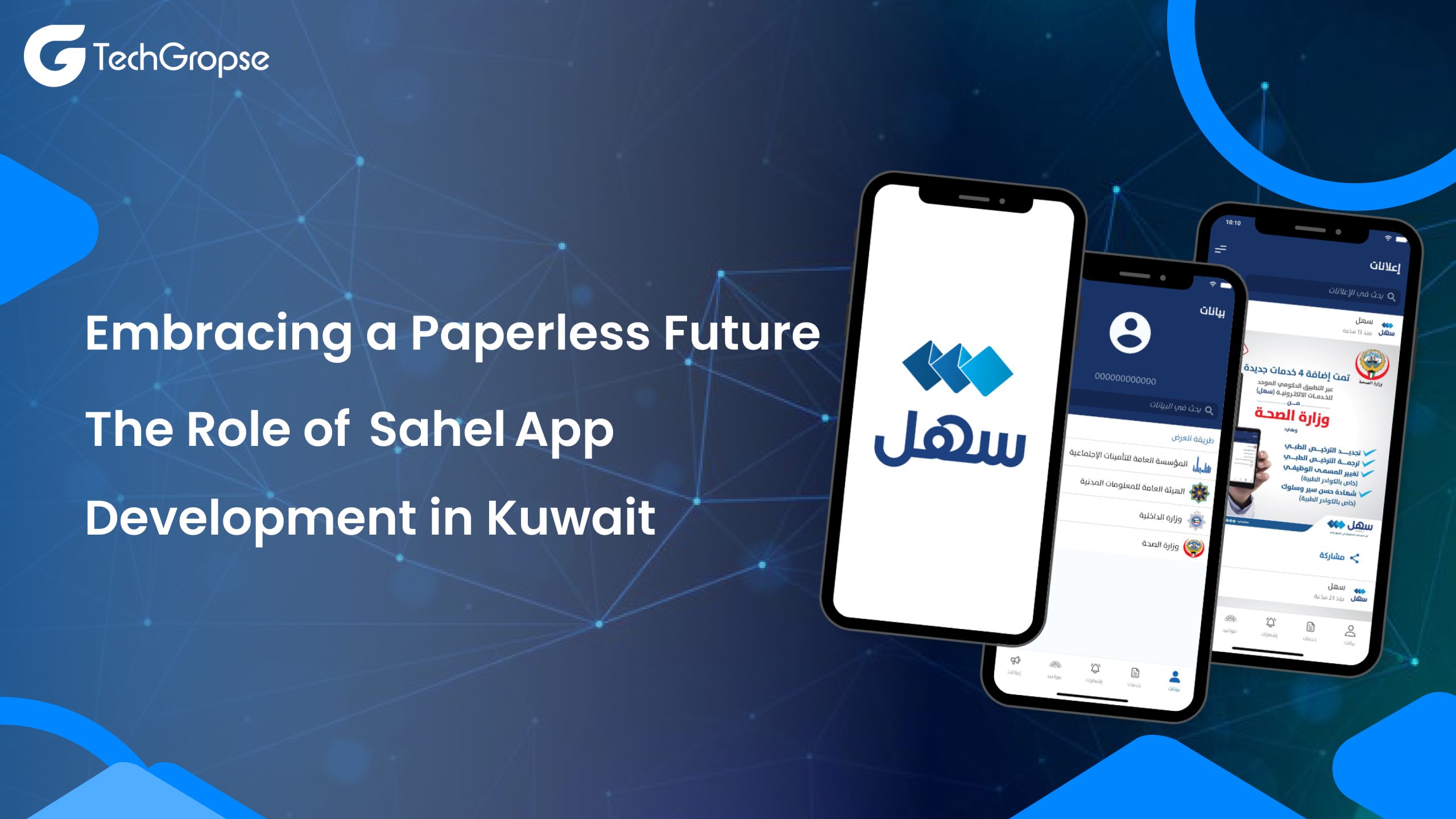Have you ever considered how ai in E-commerce and giving experiences has completely changed, giving customers an exceptional shopping experience?
Over the years, technology has become a crucial part of various industries, transforming how businesses operate and how customers interact. From personalised recommendations to interactive interfaces, advanced algorithms have elevated customization, leaving customers satisfied and businesses thriving.
Consider this: According to resources, companies using advanced technology for business strategies earn significantly higher revenue than those that do not.
It’s no surprise that leading companies invest heavily in technology-driven customization; it leads to substantial financial gains.
What is Generative AI?
Generative AI involves the utilisation of artificial intelligence systems for content creation, blurring the lines between human-generated and machine-generated content. These AI models learn intricate patterns and variations within data through various machine learning methods, enabling them to generate novel content based on this acquired knowledge. A popular example of generative AI is Generative Adversarial Networks (GANs), where two neural networks—the generator and the discriminator—collaborate to produce content that closely resembles authentic human-created material. GANs represent a significant advancement in AI technology, demonstrating its capability to mimic and create content that is indistinguishable from that produced by humans.
What is the Impact of generative ai in ecommerce and personalisation?

Artificial intelligence (AI) has emerged as a transformative force across various industries. Let’s explore how generative AI specifically impacts the retail, e-commerce, and personalisation sectors through multiple examples and use cases.
Improved Shopping Experience
Personalising the customer experience is crucial for making customers feel valued and enhancing their shopping journey. Generative AI plays a pivotal role in enabling e-commerce platforms to tailor their products to meet individual customer needs. In the retail industry, AI offers numerous advantages. By analysing extensive customer data, AI models can identify patterns and preferences, allowing businesses to offer highly personalised product recommendations.
For instance, Amazon, the world’s largest online retailer, utilises generative AI to provide personalised product suggestions. Amazon’s AI system examines user browsing and purchasing history to identify similar patterns in its vast customer database, thereby suggesting relevant products. This not only enhances user satisfaction but also drives higher conversion rates and boosts sales.
Image and Content Generation
Generative technology plays a crucial role in ecommerce app development company by creating unique visuals and content. These models can be trained to generate product images that haven’t been photographed yet, giving businesses a wide array of options to present to customers. This innovation eliminates the need for expensive photoshoots and allows e-commerce platforms to experiment with new products.
Shopify, a popular e-commerce platform, has developed “Arrival,” an AI tool that generates distinct product images by blending existing product visuals with AI-created backgrounds and overlays. This capability helps businesses create visually appealing product displays that enrich the customer shopping experience. Additionally, generative technology can also craft personalised product descriptions and content. Using advanced language techniques, these models produce descriptions that resonate with individual customers, significantly enhancing the shopping experience and driving higher engagement.
Virtual Reality and Augmented Reality
Generative technology has proven invaluable in enhancing virtual try-on experiences and augmented reality (AR) for e-commerce. Virtual try-ons allow customers to preview products such as apparel, eyewear, or makeup without physically trying them on. This technology utilises advanced models trained to recognize human features and overlay virtual product representations onto live video feeds.
For example, Warby Parker, an online eyewear retailer, employs generative technology for virtual glasses try-ons through their app. Customers can explore different frames and enjoy a personalised shopping experience from the comfort of their homes. This not only saves time but also boosts customer confidence in their purchase decisions. Similarly, generative technology is utilised in e-commerce to offer interactive AR experiences.
Customers can use smartphones or AR devices to visualise how furniture, home decor, or vehicles will look in their own spaces. This immersive approach aids customers in making informed purchase choices and enhances their overall shopping journey.
Fraud Detection and Security
Generative technology plays a crucial role in safeguarding e-commerce platforms against fraud. By analysing large datasets, these models identify irregularities and pinpoint potential fraudulent activities. They examine customer behaviour, transaction history, and geolocation data to detect suspicious patterns in real time, helping prevent fraud before it occurs.
For instance, PayPal, a prominent online payment platform, utilises advanced algorithms to monitor transactions and identify fraudulent activities. The system flags transactions that show anomalies or deviate from typical usage patterns, thereby minimising the risk of fraud and ensuring customers enjoy a secure shopping experience.
Boosts Sales and Revenue
Generative technology enhances customer experience and boosts sales and revenue for e-commerce businesses. Personalised recommendations increase opportunities for cross-selling and upselling by analysing customer preferences, browsing habits, and purchase history. This approach leads to higher conversion rates and increased sales.
Furthermore, generative technology optimises pricing strategies by analysing market trends, competitor pricing, and customer demand. Companies can adjust prices dynamically to maximise profits while staying competitive. This strategic pricing approach helps businesses increase both sales volume and overall revenue.
Customer Support and Chatbots
Generative technology has also transformed customer support in e-commerce. AI chatbots, powered by advanced algorithms, provide immediate assistance to customers, addressing their inquiries and resolving issues promptly.
These chatbots comprehend customer intentions, offer personalised recommendations, and handle diverse queries, allowing human support agents to focus on more intricate tasks. This technological advancement improves customer satisfaction by reducing response times and enhancing customer loyalty, leading to increased repeat purchases.
Also Read: Virtual Try On: A Smart Move to Augment Online Shopping
The Do’s and Dont’s For Facing Challenges in Generative AI For Ecommerce and Personalisation

Along with significant capabilities comes significant responsibility. Here are some guidelines for tackling challenges in generative AI in e-commerce and personalization, allowing you to harness its full potential while avoiding pitfalls:
Do: Understand the Data
Generative AI models rely heavily on data, so it’s crucial to comprehend the data you’re working with. This includes understanding the input data used to train the model and the output data generated by it. Assess the quality of the input data, its range of values, and the relationships between different features. Similarly, consider the characteristics of the output data, such as its distribution and variability.
Don’t: Neglect Data Privacy and Security
Data privacy and security are critical concerns when utilising generative AI for e-commerce and personalization. Protect sensitive data like customer information and transaction records with robust security measures. Adhere to regulatory requirements such as GDPR and CCPA, ensuring that both the AI model and its associated data handling processes comply with these standards.
Do: Define Appropriate Metrics
Choosing the right metrics is essential for evaluating the performance of generative AI models in ecommerce app development and personalization. Select metrics like accuracy, precision, recall, and F1 score for classification tasks, and mean squared error, root mean squared error, and R2 score for regression tasks. Consider domain-specific metrics if necessary, ensuring they accurately reflect the AI model’s performance in solving business problems.
Don’t: Oversimplify or Overgeneralize
Avoid oversimplifying the generative AI model, as this can lead to inadequate capture of data patterns or relationships. This may result in poor generalisation, where the model performs poorly on new or different datasets from the ones it was trained on. Prevent overfitting by employing techniques like regularisation, early stopping, and cross-validation.
Do: Conduct Testing
Thorough testing of the generative AI model is crucial to ensure its effectiveness in real-world scenarios. Employ various testing methods such as manual reviews, unit tests, integration tests, and A/B testing. Train the model on a diverse dataset and test it on a representative sample. Consider adversarial testing to identify potential flaws in the model.
Don’t: Deploy the Model Without Monitoring Outputs
Generative AI models operate in dynamic environments where data distributions may change over time. Continuously monitor the model’s performance and regularly validate its outputs. Detect and address any shifts in data distribution promptly, as these can degrade the AI model’s performance over time.
By following these guidelines, businesses can effectively harness the power of generative AI in e-commerce and personalization while ensuring responsible and effective implementation.
Use cases for generative ai

Knowledge management with advanced capabilities, including retrieval augmented generation (RAG) and conversational search, empowers both employees and customers by providing timely information. This facilitates faster decision-making and boosts overall productivity within organisations.
Enterprise search enhanced by RAG
Optimising enterprise search involves improving semantic search accuracy and relevance across diverse data types like documents, tables, images, and data inputs. This ensures that responses are effective and based on current data feeds, aiding in informed decision-making.
RAG frameworks analyse the meaning and context of search queries, delivering precise results even for complex information. Integrated with real-time data feeds, they provide up-to-date information, enabling employees to swiftly access the data they need.
Conversational chatbots powered by AI
Implementing AI-powered chatbots equipped with RAG capabilities ensures round-the-clock customer support. These chatbots engage customers naturally and intuitively, providing relevant information and resolving queries efficiently to enhance the customer experience.
RAG patterns help retrieve pertinent information from various sources and generate responses that mimic human interaction, improving service efficiency.
AI-driven employee training
Using advanced AI for employee onboarding facilitates rapid integration into the workforce. Large language models (LLMs) connect new hires with relevant data stored in a central knowledge repository.
Conversational search enables quick access to accurate and current information, whether related to products or human resources. This reduces the need for manual research, minimises errors, and makes the onboarding process easier, enabling employees to become productive more swiftly.
Also Insightful: eCommerce Website Development Cost in USA
Benefits of Using Generative AI
Streamline data discovery and enterprise search processes with advanced natural language processing (NLP) and generative AI capabilities from watsonx.ai. This platform simplifies access to documents, tables, charts, and other data sources, reducing the time spent searching for specific information across the organisation using foundational models.
Boost employee productivity and efficiency
Use generative AI features in watsonx.ai to empower employees with critical knowledge and insights, including HR documents, technical manuals, product information, and contract details. This enhancement accelerates productivity and resolves issues more quickly.
Automate customer self-service responses and actions
Use documents and dynamic content to create context-aware, highly personalised chatbots or question-answering tools using the RAG framework with foundational models available from watsonx.ai. Ensure that your systems access relevant content promptly to provide accurate responses and support.
Why Choose TechGropse For Your Generative AI needs?
1. Expertise:
TechGropse stands out in the field of generative AI with deep expertise and a robust portfolio of successful implementations. Their team brings specialised knowledge and experience to deliver tailored solutions that meet specific business challenges effectively.
2. Personalisation:
They excel in customising AI solutions to precisely fit unique business requirements, ensuring alignment with strategic goals and operational workflows, thereby maximising the solution’s impact and relevance.
3. Innovation:
TechGropse prioritises innovation, continuously advancing AI technologies to maintain a competitive edge and address evolving industry needs. This commitment ensures their solutions remain cutting-edge and capable of driving significant business value.
4. Scalability:
Capable of managing projects of varying scales, from small-scale pilots to enterprise-wide deployments, TechGropse ensures scalability without compromising quality or performance, accommodating business growth seamlessly.
5. Security:
With stringent security measures, TechGropse prioritises the protection of client data and compliance with regulatory standards, fostering trust and confidence in their AI solutions.
6. Support:
They offer comprehensive support throughout the AI lifecycle, from initial implementation to ongoing maintenance and updates, ensuring smooth operation and optimised performance.
7. Proven Track Record:
TechGropse demonstrates a solid track record of successful AI deployments across diverse industries, delivering measurable results and enhancing operational efficiency.
8. Client-Centric Approach:
Their client-centric ethos emphasises understanding client needs deeply, fostering collaborative partnerships and delivering tailored solutions that exceed expectations and drive sustainable success.
FAQs –
1. What is generative AI and how does it apply to e-commerce?
Generative AI refers to technology that can create content such as text, images, or even entire experiences from simple prompts or data inputs. In e-commerce, it can generate product descriptions, personalised recommendations, and dynamic website content, enhancing the shopping experience by making it more engaging and tailored to individual preferences.
-
How does generative AI improve personalization in e-commerce?
Generative AI improves personalization by analysing customer data to create unique shopping experiences. It can recommend products based on browsing history, generate tailored marketing emails, and create personalised content, such as product descriptions that appeal to specific customer preferences. This helps retailers build stronger connections with their customers and increase sales.
-
What are some examples of generative AI applications in e-commerce?
Examples include chatbots providing real-time customer support, automated product recommendations, personalised marketing campaigns, dynamic pricing strategies, and virtual try-ons for clothing or accessories. These applications help enhance user experience, streamline operations, and boost sales by catering to individual customer needs and preferences.
-
How can generative AI help with inventory management in e-commerce?
Generative AI can predict demand patterns and optimise inventory levels by analysing sales data, customer behaviour, and market trends. This reduces overstocking or stockouts, ensuring that the right products are available when customers need them. Improved inventory management leads to cost savings and increased customer satisfaction.
-
What impact does generative AI have on customer service in e-commerce?
Generative AI enhances customer service by providing instant, accurate responses through chatbots and virtual assistants. These tools can handle common queries, process orders, and troubleshoot issues, freeing up human agents to focus on more complex tasks. This leads to faster response times, improved customer satisfaction, and operational efficiency.
-
Can generative AI help with content creation for e-commerce websites?
Yes, generative AI can create engaging and relevant content for e-commerce websites, such as product descriptions, blog posts, and social media updates. By analysing customer preferences and market trends, it generates content that resonates with the target audience, improving engagement and driving more traffic to the site.
-
How does generative AI affect marketing strategies in e-commerce?
Generative AI enables more effective marketing strategies by personalising ads and email campaigns based on customer behaviour and preferences. It can create targeted content, optimise ad placements, and predict customer responses, leading to higher conversion rates and better ROI for marketing efforts.
-
What are the potential risks of using generative AI in e-commerce?
Potential risks include data privacy concerns, algorithmic biases, and over-reliance on automated systems. Ensuring transparency, ethical use of data, and regular monitoring of AI systems can mitigate these risks. Businesses should also have contingency plans to handle any issues arising from AI-generated content or decisions.
-
How can small e-commerce businesses benefit from generative AI?
Small businesses can use generative AI to compete with larger companies by automating tasks like customer service, marketing, and content creation. This reduces operational costs and allows small businesses to offer personalised experiences, improving customer loyalty and expanding their market reach.
-
What is the future outlook for generative AI in e-commerce?
The future outlook is promising, with continued advancements in AI technology expected to further enhance personalization and efficiency in e-commerce. As AI systems become more sophisticated, they will provide even deeper insights into customer behaviour and preferences, enabling highly customised shopping experiences and driving innovation in the industry.

Hello All,
Aman Mishra has years of experience in the IT industry. His passion for helping people in all aspects of mobile app development. Therefore, He write several blogs that help the readers to get the appropriate information about mobile app development trends, technology, and many other aspects.In addition to providing mobile app development services in USA, he also provides maintenance & support services for businesses of all sizes. He tried to solve all their readers’ queries and ensure that the given information would be helpful for them.










